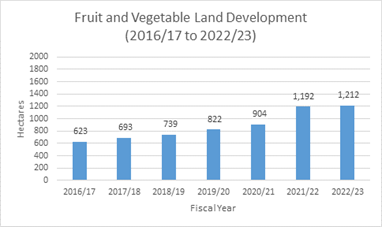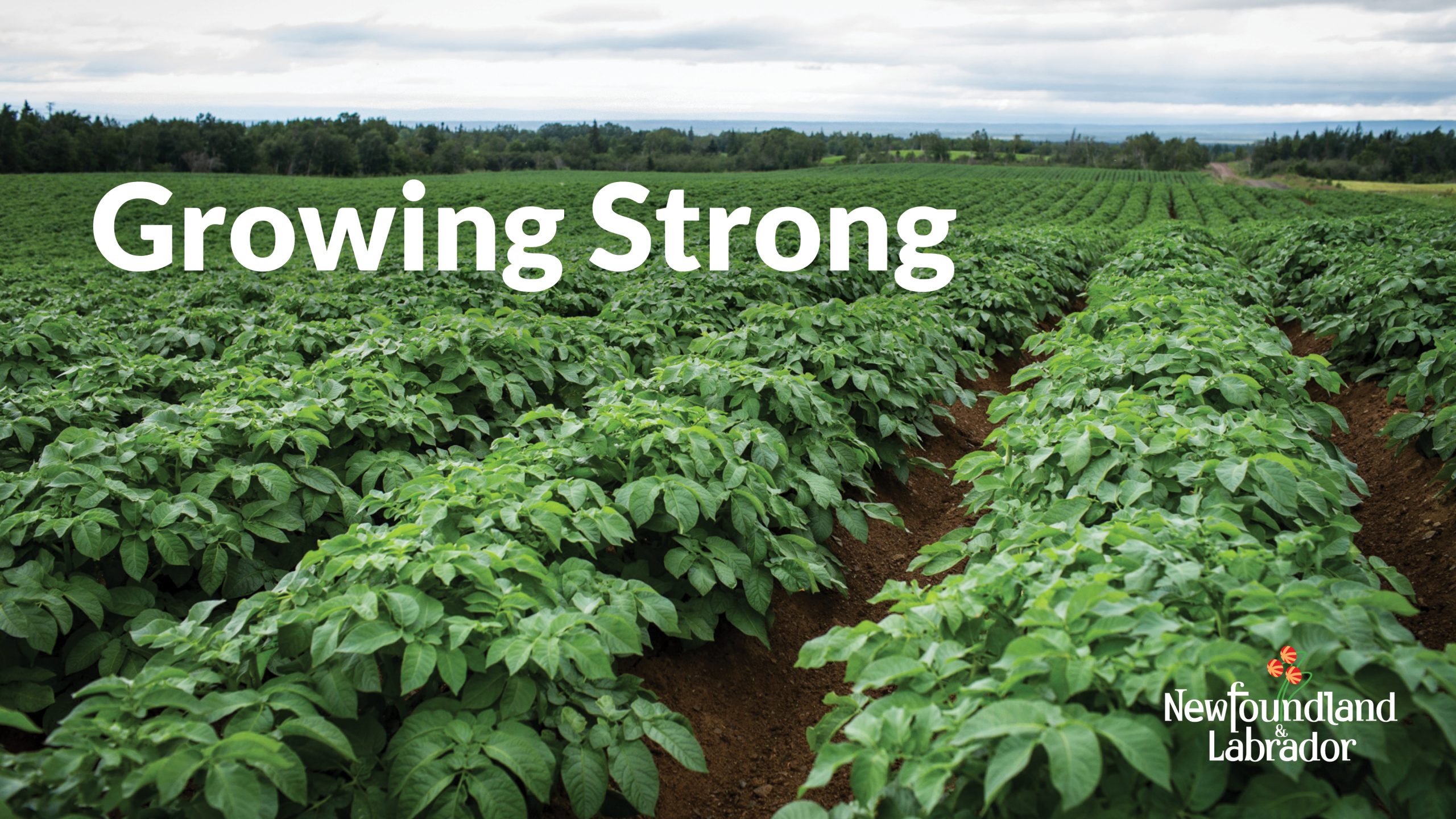The Honourable Derrick Bragg, Minister of Fisheries, Forestry and Agriculture, today provided an update on the Provincial Government’s food self-sufficiency target, efforts to protect and enhance farmland, and ongoing support for the agriculture sector.
Minister Bragg will be available to the media to discuss the considerable progress that has been made to improve food self-sufficiency in Newfoundland and Labrador at 11:30 a.m. today, December 15, at the Fisheries, Forestry and Agriculture office at 192 Wheeler’s Road, Corner Brook.
Newfoundland and Labrador’s agriculture sector has more than doubled the province’s food self-sufficiency in fruit and vegetable production, reaching more than 21 per cent this year. This exceeds the goal of growing food self-sufficiency from 10 per cent to 20 per cent by the end of 2022.
Set in 2017, the target is based on the cumulative amount of agricultural Crown land that has been developed and enhanced for fruit and vegetable production. This is the most reliable means of tracking progress and improvement since the amount of land available for agriculture demonstrates capacity for production, regardless of seasonal variables.
Since 2016, the amount of Crown land developed and enhanced for fruit and vegetable production has more than doubled, from 590 hectares to 1,212 hectares. Farmers are producing traditional crops including potato, cabbage, turnip, carrot and strawberries, as well as diversified products such as broccoli, kale, leek, onion, asparagus, canola, wheat and cranberry.
Newfoundland and Labrador’s agriculture sector is 100 per cent self-sufficient in production of fluid milk, chicken and eggs, and self-sufficiency in beef and sheep production has more than doubled since 2016. The Provincial Government continues to work closely with the dairy, poultry and egg sectors to continue increasing the amount of locally produced products.
Department staff continue to work closely with farmers and producers to offer advice and support on all aspects of farming, from primary production and food safety to farm business management. Through the Canadian Agricultural Partnership, more than $28.7 million has been invested since 2018 to support 633 agriculture projects, including 50 new, first-year farmers, in Newfoundland and Labrador. Additionally, through the Provincial Agrifoods Assistance Program $2.25 million is allocated annually to support primary production, secondary processing, and land clearing activities.
More information on support for farmers, farmland development, and the agriculture sector is available in the backgrounder below.
Quotes
“Work in the agriculture sector is rewarding and vital, but also extremely challenging, especially in times like these. Current and ongoing global issues affecting the cost of fuel, fertilizer and grain have affected all Canadian farmers, from backyard growers to large-scale commercial operations. It has taken hard work and dedication to achieve these important milestones in food self-sufficiency and land management. We could not be more proud of our farmers, producers, and agriculture sector professionals who helped get us here.”
Honourable Derrick Bragg
Minister of Fisheries, Forestry and Agriculture
“Working in agriculture can be difficult at the best of times, and farmers have certainly faced more than their share of challenges. I am proud to see that with support from the Provincial Government, our farmers and producers have risen to the challenge to double fruit and vegetable production. Throughout the pandemic, and in the face of recent world events and high production costs, farmers and producers continue to prove their strength and resilience, and adapt to new challenges in food production. Congratulations to all of you on this important achievement.”
Wayne Simmons
President, Newfoundland and Labrador Federation of Agriculture
Learn more
Land for Agriculture
Agriculture Programs and Funding
Follow us on Twitter @GovNL and @FFA_GovNL
Follow us on Facebook
BACKGROUNDER
Land Developed for Fruit and Vegetable Production since 2016-17

Source: Department of Fisheries, Forestry and Agriculture
Ongoing Initiatives to Develop and Conserve Agricultural Crown Land
Land Consolidation Program: The Provincial Government may purchase land from non-farming residents and retiring farmers and allocate it to existing, part-time, and new entrant commercial farmers for agricultural use. Since 2001, the program has purchased approximately 3,200 acres of land, which has contributed to the province’s agriculture land base. This is the only program of its kind in Canada.
Funding for Land Enhancement Initiatives: Through the Canadian Agricultural Partnership and Provincial Agrifoods Assistance Program funding is available for existing farmers and new entrants to clear, enhance and enrich farmland. Since 2018, 802.9 acres of land have been enhanced through funding from the partnership, and 1,531.6 acres through the Provincial Agrifoods Assistance Program.
Agricultural Leases and Licences to Occupy: 50-year agricultural leases are available for commercial farming for an annual rental fee of $4 per hectare. Licences to occupy are available for non-commercial farming, pasture land, and home gardens for a maximum of five years with the option to renew if eligible.
- 2,276 agriculture titles (leases, licenses, and grants) are currently active
- 718 of these have been issued since 2001
Requests for Proposals for Agricultural Land: Existing and new entrant commercial farmers may submit proposals to bring agricultural land into production. Proposal must include a detailed Farm Development Plan outlining suitability of the project. Proposals are accepted for:
- Agriculture Development Areas allocated for agricultural use based on soil surveys and proximity to other agricultural operations throughout the province. These areas are identified based on soil suitability mapping.
- Agriculture Areas of Interest totaling approximately 62,000 hectares (15,321 acres) of Crown land identified for long-term agricultural use. There are currently 50 AOIs available of 59 identified.
Property Tax Exemption Program for Agricultural Land: Provides tax relief to commercial farmers who have high tax evaluations due to the extent of land required to operate efficiently and effectively. This program is also an incentive for producers to develop idle land and bring it into production. In 2022, 13,721 acres were exempt from real property tax.
Ongoing Programs to Support Farmers and Producers
Canadian Agricultural Partnership: A $3-billion, five-year Federal/Provincial/Territorial program to innovate, strengthen and grow Canada’s agriculture and agri-foods sector. Projects focus on new entrants, secondary processing, food self-sufficiency, climate change, and risk mitigation for the agriculture industry. A total of $37 million will be invested by 2023. The Sustainable Canadian Agricultural Partnership, a new $3.5-billion, five-year agreement, will launch in April 2023.
The Partnership allocated $690,360 in 2022-23 to support the Newfoundland and Labrador Federation of Agriculture and its many initiatives, including Agriculture in the Classroom NL, Young Farmers Forum, Agriculture Expo, and Open Farm Day.
Provincial Agrifoods Assistance Program: Allocates $2.25 million annually to provide financial assistance to eligible applicants involved in primary production or secondary processing activities that will:
- Improve the economic viability of the agriculture and agrifoods industry;
- Promote commercialization and growth in the sector; and
- Enhance the competitive capability of the agriculture and agrifoods industry.
- The program may also provide selective assistance to regional pastures, agribusinesses, and agricultural groups for initiatives that support the priorities of the program.
Economic Recovery Plan for Job Creation in Renewable Industries: At the onset of the COVID-19 pandemic, the Provincial Government invested $13 million in agriculture initiatives to create jobs in the agriculture sector and assist farmers and producers. As part of this initiative, an additional 700 acres were developed and three leases issued for large-scale potato production to help meet our food self-sufficiency goal. This land went into production in 2022.
Provincial Vegetable Transplant Program: Vegetable transplants produced at the Centre for Agriculture and Forestry Development in Wooddale help commercial farmers diversify crops and increase yields. The Provincial Government grew and shipped more than four million transplants to eligible commercial famers last year.
Agriculture Research Trials: Collaboration with academic institutions and other government agencies to conduct research on innovative crop and livestock production practices helps support the agriculture industry and offers training opportunities for students. Government-led research and demonstration trials currently involve potato fertility, high-intensity vegetable production demonstrations, livestock feed self-sufficiency (forage, grain and oilseeds varietal and optimization research) and fruit crop varietal and optimization trials (apples, wine grapes, cranberry, and half-high blueberry).
Agriculture Limestone Subsidy Program: The department budgets $411,800 annually to purchase and deliver agricultural limestone, required to improve soil productivity, plant efficiency and environmental sustainability. Farmers pay a flat rate $25/tonne (plus HST) for bulk limestone and delivery. Newfoundland and Labrador is the only province in Canada that subsidizes agricultural limestone.
Provincial Farm Equipment Leasing Program: Offers eligible farmers and producers access to equipment to reduce the financial burden of overhead, maintenance, repair, and storage costs. Available equipment includes tractors, rock pickers, drills, plows, cultivators and other major machinery. Equipment banks are located in Happy Valley-Goose Bay, Bishop’s Falls and Pynn’s Brook.
Provincial Certified Seed Potato Program: Produces disease-resistant, certified seed potato locally and eliminates cost and issues of inaccessibility associated with importing potato seed. The provincial Centre for Agriculture and Forestry Development in Wooddale produces 375,000 pounds of certified seed potatoes annually. Seed is available to certified seed potato growers at a subsidized rate of $5.50 per 50 pounds.
Provincial Soil, Plant and Feed Laboratory: The provincial fee-for-service lab analyzes nutrient composition of soils, plants and feed, and helps farmers make management decisions about soil quality, yield and productivity of crops and livestock.
Agricultural Extension Services: Consultative and advisory support is available to primary and secondary producers. Trained agrologists are engaged in a variety of agricultural sectors that support crop and livestock development. These staff transfer knowledge to the industry on new and innovative agronomic practices, integrated pest management, food safety, soil and organic resource management, risk management, herd management and adherence to the codes of practice. We also support all provincial agriculture commodities, including dairy, poultry, beef, sheep, swine, apiculture, all field fruit and vegetable crops, organic and greenhouse production.
Community Garden Support Program: Community gardening is also contributing to food self-sufficiency. In 2021-22, thanks to funding from the Community Garden Support Program, 7,400 people, including youth and seniors, worked together in 146 community gardens to grow fresh food for their communities and families.
Farm Animal Veterinary Services: Provincial veterinarians and animal health technologists provide routine and 24-hour emergency services to the province’s livestock and poultry. A veterinary pathologist and medical laboratory technologists are responsible for veterinary diagnostic and food safety testing for the agriculture industry. Newfoundland and Labrador is one of only two provinces that provides veterinary services for farm animals The Provincial Government also operates two regulatory food safety programs, including the dairy farm inspection and meat inspection programs.
